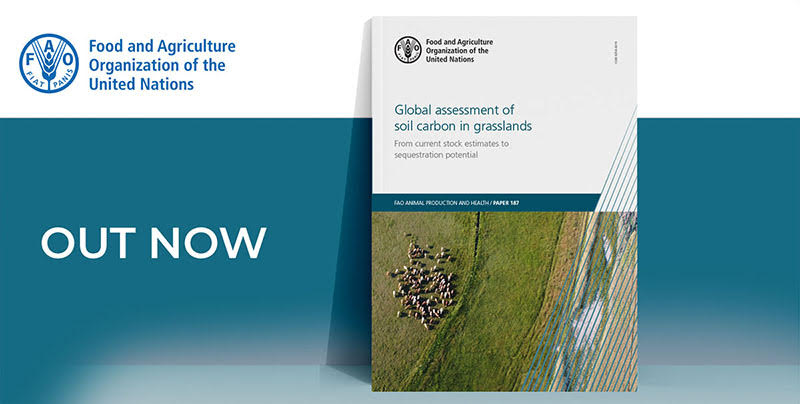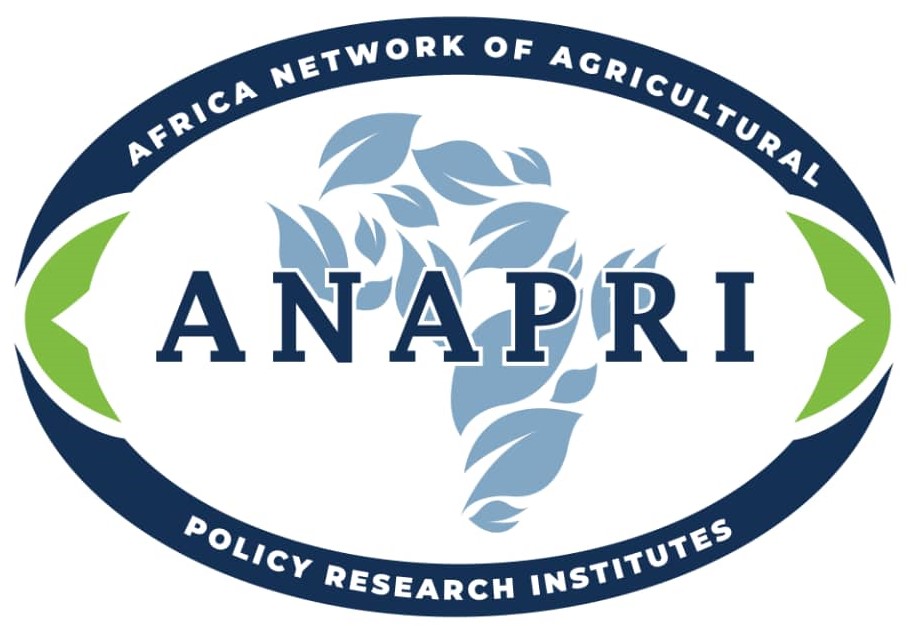Global assessment of soil carbon in grasslands
From current stock estimates to sequestration potential

Anthropogenic activities such as intensive livestock grazing, agricultural management practices, and other land-use activities contribute to the loss of soil carbon in grasslands. The FAO Livestock Environmental Assessment and Performance (FAO LEAP) Partnership developed a Global assessment of soil carbon in grasslands: From current stock estimates to sequestration potential, in collaboration with France’s Institut national de la recherche agronomique (INRAE). The study provides a spatially explicit report on the state of grassland soils in the world and estimates the potential of grasslands to sequester carbon in soils.
Deadline: 1 March 2023
We would like to draw your attention to the call for papers for a QOpen Special Issue:
Please consider submitting and help to spread the word!
Closing Date: 24 February 2023, 12pm (Irish Time)
Location: Teagasc, Ireland
Full information on this role and how to apply can be found HERE.
Background
The Teagasc post-doctoral programme provides training and development opportunities for early career scientists that enhances their experience of learning and equips them with the necessary skills for the next stage of their chosen career in research.
The agri-food sector is Ireland’s largest indigenous industry and a key player in the national economy. Sustainability of ruminant production has implications for the environment, the economy and food security. ‘Microbiome’ is a term that describes the genome of all the microorganisms, symbiotic and pathogenic, living in and on all vertebrates. Microbiomes associated with the host play a key role in health, welfare and environmental efficiency in ruminant production systems. This post doctoral fellowship is part of a large international project called ‘HoloRuminant’, funded by the EU Horizon 2020 Framework Programme for Research and Innovation (2014-2020). The goal of the project is to elucidate the development and role of ruminant-associated microbiomes and their interplay with the host in early life and throughout fundamental life events. The project will use a holistic multi-omics approach to characterise the acquisition and evolution of microbiomes from different ruminant body sites and their influence on the host’s resistance to disease and environmental efficiency of production. The project will determine microbiomes’ functions by combining multi-level information for microbes, host and their interaction; define microbiomes’ roles during challenging life periods such as perinatal, weaning, and after exposure to pathogens; and evaluate the effect of ruminant microbiomes on critical phenotypes for sustainable production, health and welfare.
This is a research focused training role, the primary purpose of which is to provide early career scientists with the opportunity to develop their research skills and competencies.
The PD Fellow will, while working in conjunction with senior research staff, gain insight and experience into a variety of areas including the processes of project and budgetary management, publishing in peer-reviewed academic journals, writing grant applications, and attracting external funding; the development of active collaboration with relevant national and international research communities; the development of communication and presentation skills, leadership and management skills, and overall career development.
Modules will be conducted under the supervision and direction of the (Project Leader) or other designated manager in conjunction with the Head of Department.

We are pleased to welcome the Global Green Growth Institute (GGGI) as the latest formal Partner of the Global Research Alliance on Agricultural Greenhouse Gases!
Headquartered in the Republic of Korea, GGGI is a treaty-based intergovernmental organization that was established to support developing country governments’ transition to a model of green growth that promotes economic growth to meet development aspirations while solving the climate crisis and protecting natural capital, with a strong focus on nature-based solutions and reducing social inequities.
GGGI currently has 45 Member countries plus another 20+ Partner countries (aspiring Members) and has operations in over 40 developing countries and emerging economies – and growing – to implement actions that reconcile short-term development needs with a long-term green growth vision. GGGI supports its Members and Partners to: (1) develop green growth policies, ambitious NDCs and LTS/LEDS for the Paris Agreement; and (2) originates, develops, structures and mobilizes finance for green investment projects. To date (end 2022) GGGI mobilized around USD8 billion in green and climate finance for investments and sustainable finance instruments such as green bonds.
We are delighted that GGGI, as a GRA partner, is looking forward to potentially expanding the membership of both organizations and establishing complementary initiatives in member countries. Additionally, in accordance with GGGI’s mandate and expertise, GGGI is proposing to contribute to GRA’s objective to increase and/or mobilize investment for mitigation practices and technologies to develop more efficient and productive agricultural systems by supporting governments in preparing bankable projects (e.g., based on GRA’s research work and breakthrough solutions) and in identifying potential financing.
Learn more about GGGI here: https://www.gggi.org/

We are pleased to welcome the Africa Network of Agricultural Policy Research Institutes (ANAPRI), registered as ReNAPRI, as the newest formal Partner of the Global Research Alliance on Agricultural Greenhouse Gases!
Headquartered in Zambia, ANAPRI’s vision is to be a dynamic Pan-African network of universally recognized national agricultural policy research institutes that generate relevant and high-quality evidence, to guide and inform effective policy decisions that promote sustainable solutions across the continent.
ANAPRI’s mission is to play an active role in transforming Africa’s agricultural sector by developing the capacity of national agricultural policy research Institutes in the continent, strengthening, and nurturing dynamic collaboration, towards providing objective and innovative policy advice to national, regional, and continental level stakeholders, through effective outreach.
Of particular relevance to the GRA, ANAPRI is currently coordinating the USAID and African Union Commission supported project CACCI (Comprehensive Action for Climate Change Initiative), which aims to help countries that have ratified the Paris Agreement to adapt and build resilience to the effects of climate change. The programme will build local and regional capacity, and institutional infrastructure, and develop an Africa-wide accountability platform that not only informs debate at the continental level, but also informs global discussion on climate change mitigation and adaptation.
We are delighted that ANAPRI, as a GRA partner, is looking forward to engaging with GRA members to explore potential joint opportunities and co-development of future work plans.
Check out the ANAPRI website here: https://www.renapri.org/
A recording of the November 2022 Croplands Research Group Webinar, titled “Predicting Soil Organic Carbon Dynamics in Long-term Agricultural Experiments Using the CQESTR Model”, is now available to view.
This webinar session featured a presentation from Dr. Hero Gollany (USDA).
Click HERE to view the webinar recording.
The 2023 CaSSECS annual meeting will be held on 20-23 February 2023 in Niamey, Niger. The programme can be found below. If you would like to attend the meeting, or would like further information, please contact Anaïs Boury-Esnault.
The December 2022 Croplands Research Group Newsletter is now available to read online!
This issue includes very interesting papers dealing with the use of legumes to mitigate climate change carried out in Spain. A summary of the excellent International Symposium on Climate Resilient Agri-environmental Systems (ISCRAES) is also presented. Finally, the new book “Advances in temperate agroforestry” requesting contributions is announced. The three CRG co-Chairs wish you a Merry Christmas and a happy new year, 2023.
Location: Zurich, Switzerland
Agroscope is seeking a postdoc to provide support with the development of a model-based N2O inventory for agricultural soils in Switzerland. See below for further details.
Closing date: 15 February 2023, but this position will remain open until filled
Location: University of Minnesota, USA
The University of Minnesota, College of Food, Agricultural and Natural Resource Sciences, is seeking an Assistant Professor, Livestock Sustainability.
Position Overview
Assistant Professor, tenure-track (9-month) position with research (60%) and teaching (40%) responsibilities involving sustainability of livestock production systems. The individual in this position will work closely with UMN faculty and students to conduct externally funded research in one or more areas of livestock sustainability, including aspects of nutrient cycling, air and water quality, and/or resource management. The candidate may conduct research in resource utilization with their preferred livestock or poultry species. The teaching opportunities will include development of an interdisciplinary and multispecies undergraduate course on livestock and poultry sustainability, graduate course(s) in the individual’s areas of expertise, and contributions to departmental courses and student advising. Engagement with external partners will be critical for the success of the individual in this position. The tenure home of this position is in the Department of Animal Science (http://ansci.umn.edu). The successful candidate is expected to develop independent as well as collaborative research programs and to recruit and mentor graduate students including those from diverse backgrounds. Collaboration among research faculty and with colleagues in other disciplines is expected. This position is funded by legislative action through the Agricultural Research Education Extension and Technology Transfer (AGREETT, https://agreett.umn.edu) program.
For further information about the role and how to apply click HERE.
Deadline: 22 January 2023
CCAC is looking for a “CCAC Agriculture Expert” to provide full-time support to help drive action in the agriculture sector and ensure a well-functioning and strategic CCAC Agriculture Hub. S/he will provide direct support to national governments and CCAC National Consultants; provide technical reviews of funding proposals related to the sector; provide support for technology assessments and advise on new business models; provide support for policy and regulatory development; engage key organizations to expand the sectoral network; deliver various activities as set out in the Work Plan and Budget; and contribute to internal coordination within the CCAC Secretariat.
Please disseminate broadly with your extended network. To learn more visit: https://careers.un.org/lbw/jobdetail.aspx?id=198029&Lang=en-US&R6wF9AvbqY=7CF02EF98284A4DFCBA238EF2EFD7761
Kind regards, The Secretariat

